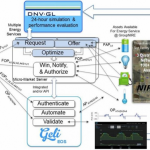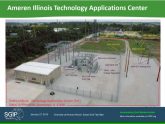The microgrid market opportunity in the U.S. is projected to double from $836 million in 2016 to $1.66 billion in 2020, according to recent data from GTM Research. The drivers behind this include the need for greater grid reliability and resiliency, the integration and control of distributed energy resources (DER) into the grid, as well as the desire by C&I end users in campus environments to control energy costs and adopt more on-site, renewable energy generation. These trends, as well as the need to reduce reliance on fossil fuels, are compelling utilities, municipal governments, rural communities, and large energy customers to embrace microgrids as key strategy for meeting their energy needs.
 |
The 4th Microgrid Global Innovation Forum, May 15-17, 2017 in Washington, D.C., brings together thought leaders, utilities, energy providers, project managers and other stakeholders for two days of focused networking and information sharing concerning the latest technological developments, design, implementation and operation of hybrid renewable energy microgrids. The emphasis is on maximizing the business case for microgrids, integration into the larger grid, and sharing real-world case studies of both grid-tied and off-grid/remote environments. Topics to be covered include: |
• Ownership models and benefits for multiple stakeholders
• Utility-driven microgrids and deployment partnerships
• Public-purpose, city-community, and commercial microgrid deployments
• Integration of microgrids into the larger grid
• Determining the correct technology mix for hybrid energy systems
• Advanced battery, fuel cell, and flow battery technologies
• Microgrid power control, management, and integration
• Military microgrid case studies
• Latest technology advances for optimizing performance and control
• Regulatory and public policy developments impacting microgrids
• Standards and interoperability issues
• Market drivers and opportunities worldwide
• Microgrids relation to virtual power plants and transactive energy
• and more!
Why Participate?

Real-World Lessons — Learn key take-aways from leading microgrid projects and how to apply them in various scenarios
Executive Networking — Forge relationships and partnerships with executive decision makers and stakeholders across the microgrid spectrum.
Results Oriented — Examine technology advances at the forefront of microgrid optimization. Interact with project principals and get up to speed on best practices and success strategies.
Policy trends — Washington is the fulcrum for policy and regulatory trends affecting microgrids in the U.S. Network with key policymakers who are working to facilitate microgrid advancement and deployment nationwide.
Who Should Attend?
|









